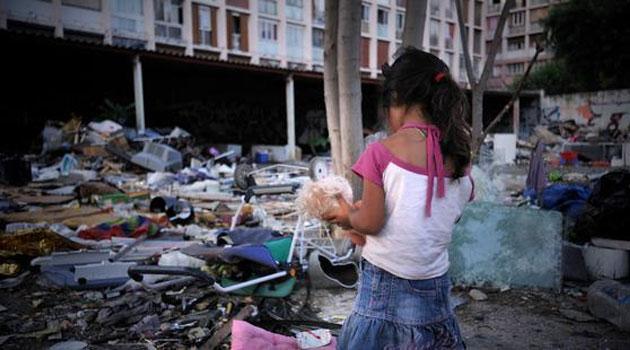Roma in Europe: Demanding justice and protection in the face of violence

European states are failing to curb and in some cases even fuelling
discrimination, intimidation and violence against Roma, Amnesty International
said on International Roma Day on 8 April.
“There has been a marked rise in the frequency of anti-Roma violence in
Europe in the last few years. The response to this alarming phenomenon has been
woefully inadequate. It is unacceptable that in modern-day Europe some Roma
communities live under the constant threat of violence and pogrom-like attacks,”
said John Dalhuisen, Europe and Central Asia Programme Director.
DOCUMENT
John Dalhuisen: There has been a marked rise in the frequency of anti-Roma
violence in Europe in the last few years. The response to this alarming
phenomenon has been woefully inadequate. It is unacceptable that in modern-day
Europe some Roma communities live under the constant threat of violence and
pogrom-like attacks.
“All too often European leaders have pandered to the prejudices fuelling anti-Roma
violence by branding Roma as anti-social and unwelcome. While generally
condemning the most blatant examples of anti-Roma violence, authorities have
been reluctant to acknowledge its extent and slow to combat it. For its part,
the European Union has been reluctant to challenge member states on the systemic
discrimination of Roma that is all too evident.”
Amnesty International’s report, We ask for justice”: Europe’s failure to
protect Roma from racist violence, examines hate motivated violence and
harassment perpetrated against Roma by officials and ordinary citizens in the
Czech Republic, France and Greece, illustrating the organization’s concerns
across the continent.
“On many occasions law enforcement agencies are failing to prevent racist
attacks and ensure that hate motives are properly investigated and perpetrators
brought to justice. The fact that racist attitudes remain entrenched in many
police forces is more often denied than addressed," said John Dalhuisen.
Governments across Europe fail the Roma in multiple ways. Discrimination,
forced evictions, segregation and sub-standard education are the norm in many
countries.
“The European Union has legislative arsenal at its disposal to ensure that
discriminatory violence, and discrimination more generally, are addressed.
However, the European Commission, which is responsible for overseeing the
application of EU laws in the member states, has to date failed to take clear
and decisive action to address discrimination and violence against Roma in
member states,” said john Dalhuisen.
Amnesty International calls on national governments and the European Union to
commit, visibly and wholeheartedly, to eradicating the scourge of anti-Roma
discrimination, intolerance and violence across the region.
Czech Republic
Throughout the summer and autumn of 2013, Czech far-right groups staged
series of anti-Roma protests in dozens of towns and cities across the country.
The protests meant systematic harrasmant of Romani communities.
Between June and October 2013, far-right extremists joined by the local
residents held regular marches through the city of Èeské Budìjovice to a housing
estate following a conflict at a children’s playground between Roma and non-Roma
adults.
Štefan, a Romani man told Amnesty International: “Some people do not realize
that [during the demonstrations, the Roma] have to stay at one place, that
children… are afraid. This lasts the whole day and leaves trauma… Nobody
deserves to experience something like this. People experienced this during the
war and I think that in the year 2013, in the 21st century, we don’t have to
experience it again.”
France
Having fled discrimination in their countries, many of the 20,000 Roma in
France live in informal settlements where they rarely have access to basic
services, such as water and sanitation. They are often forcibly evicted from
their shelters, harassed by the police or other citizens and sometimes attacked.
On the evening of 22 November 2011, the police went to the informal
settlement next to the church of St. Martin d’Arenc in Marseille with the aim of
forcibly evicting the 10 Roma families who lived there. They allegedly sprayed
tear gas inside the tents where children were sleeping and then destroyed the
tents and other personal belongings.
R. was beaten up by the police. He said: “I wanted to run away but I couldn’t
see anything, I just saw a gate in front of me, I tried to reach out to it but
as soon as I approached it, I just had the feeling that my leg broke and then I
don’t remember anything else. R. underwent surgery for a fractured thighbone and
spent six months in a rehabilitation centre.
Roma migrants in Marseille do not generally report cases of harassment and
violence because of lack of trust in the police or fear of further
victimization. S., a Roma social worker who used to live in an informal
settlement, said: “Roma people are really scared of the police; I usually take
kids to the hospital for medical treatments and they are afraid whenever they
see the police on our way”.
Greece
The estimated 250,000 to 350,000 Roma living in Greece have been at the
receiving end of discriminatory treatment for generations.
During 2012 and 2013 a series of pogrom-like attacks against a Roma community
took place in Etoliko, a village in western Greece.
Irini told Amnesty International her experience of an attack on 4 January
2013 when approximately 70 individuals threw Molotov cocktails, stones and
wooden planks at their homes: “When I saw them coming, I grabbed my children and
locked us up in the house. My children were crying, screaming… I was frightened.
Looking out of the window I knew most of them, we grew up together. They threw a
glass bottle from the window and set the house on fire.”
Six houses and four cars were firebombed or damaged by the attackers that
day. Several Roma told Amnesty International that they felt betrayed by the
police. One said: “I could see just two policemen from inside the house… They
were just staring and asking people to stop. They did nothing more than this”.
VIDEO